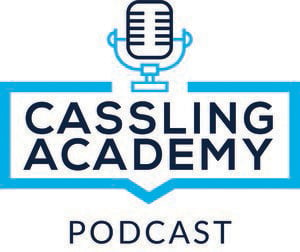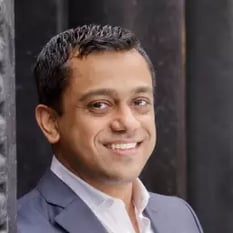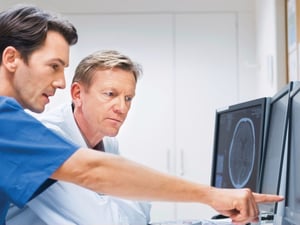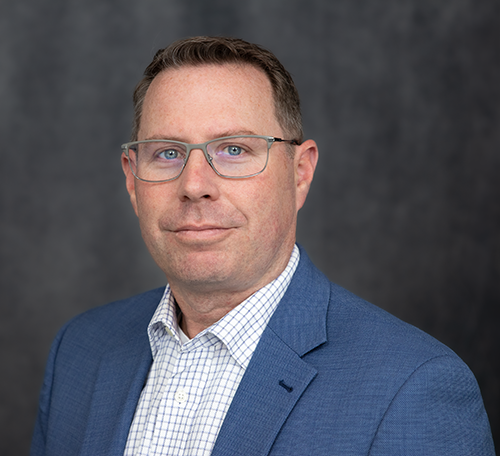CEO at DocPanel Talks Entrepreneurship and Transforming the Customer Experience in Radiology
by Kyle Salem, Ph.D. on Jan 13, 2020
 On this episode of the Cassling Academy Podcast, Dr. Kyle Salem talks to Nirish Mathias, CEO at DocPanel, a B2B and B2C radiology software company connecting patients and providers to a network of fellowship-trained radiologists. Their wide-ranging discussion touches on artificial intelligence, trends in the industry and even the entrepreneurial spirit needed to launch a healthcare start-up.
On this episode of the Cassling Academy Podcast, Dr. Kyle Salem talks to Nirish Mathias, CEO at DocPanel, a B2B and B2C radiology software company connecting patients and providers to a network of fellowship-trained radiologists. Their wide-ranging discussion touches on artificial intelligence, trends in the industry and even the entrepreneurial spirit needed to launch a healthcare start-up.
The following is an interview transcript edited for clarity and length. If you prefer, you can listen to the full podcast in the player below.
Kyle Salem: Hello, everyone. Welcome back to the Cassling podcast. I'm your host, Kyle Salem, and here with me today is Nirish Mathias. He's the CEO at DocPanel, and even more than that, he's a good friend of mine. So welcome to the show.
Nirish Mathias: Thank you, Kyle. It's really nice to be here, and thanks for calling me a friend. I appreciate that.
Kyle Salem: We've worked together for a number of years now, actually, on crazy stuff and less crazy, more like how does the rubber hit the road sort of stuff, from a strategic standpoint. So it's always fun to get together with you and even just talk about where we see the industry going. And I hope that's what we'll be able to do a little bit today, as well as talk about DocPanel, your current venture.
Nirish Mathias: Yeah. I've always found our conversations very real. And we've been through a lot in the last three years. It's been quite a journey. Lots of adventures.
Kyle Salem: So let's talk a little about you. You know I like the coffee story, so why don't we start there, with the young boy related to the coffee, and get us all the way to CEO of DocPanel.
Nirish Mathias: Wow. That brings me back to when I was 14. And my family is in India, and we have owned coffee farms for 125 years. When I was 14, I told my dad, ‘Someday I'll maybe run this business.’ And he said, "You've got to earn the right to run this coffee business."  So I said, ‘Okay, I'll show you,’ sort of jokingly. But at the age of 21 I decided, ‘Let's take some money, $600, move to the US.’ And me and a buddy started an investment bank. Quite honestly, we didn't know...
So I said, ‘Okay, I'll show you,’ sort of jokingly. But at the age of 21 I decided, ‘Let's take some money, $600, move to the US.’ And me and a buddy started an investment bank. Quite honestly, we didn't know...
Kyle Salem: With $600? I didn't know that was possible.
Nirish Mathias: Neither did I. Lived on my sister's couch, classic American dream, making phone calls out of a phone book to investment banks to find deals. I did that for 13 years, had a very successful time at it, but doing healthcare banking felt very transactional. I didn't feel like I was contributing anything, other than one company buying another one and I made a commission. I didn't feel like I was actually impacting anybody's life. When the opportunity came to go work for a client who offered me a job, I sort of took it to see what else I could do. And I worked at a $1 billion healthcare company, and they very quickly realized that I was good at creative thinking, so they put me at all their big clients like United Healthcare and Cigna and Aetna. And so I ended up doing a lot of interesting things for about three years. I got really deep into how payers and providers operate and all the issues that they face, and I was just fascinated by how many things you could fix. Literally you can-
Kyle Salem: Did you say fascinated or frustrated?
Nirish Mathias: Fascinated.
Kyle Salem: Oh, okay. I just…
Nirish Mathias: Trust me, I was frustrated, too. But fascinated that every little pain point in healthcare is either a billion-dollar solution or problem. After three and half years of that, I took a pause and went on a sabbatical to Rwanda to help entrepreneurs in Kigali. While this idea was presented to me as an investor, it really touched me on a personal level. I had a visceral reaction to what the pain point was and how we could solve it. I couldn't sleep; I was thinking about it so much. And that's how I ended up saying, ‘Not only will I invest in the company, I want to run it, I want to build it.’ And that began the journey of building up this company, DocPanel.
Kyle Salem: Let's take one second and just step back for everybody and talk a bit about what DocPanel is, what they do, so that we're all on the same page.
Nirish Mathias: DocPanel is a network of sub-specialty radiologists. Over the last three years we've assembled 300 radiologists, and we’re providing access to those radiologists to all kinds of uses. So any kind of imaging center hospital can access the best specialists in the country on a per case basis. It's an on-demand marketplace for radiologists. And we also have a business that we allow patients to upload their MRIs and get a second opinion. The whole idea is the right specialist for the right case. If you have a brain MRI, you want one of the best brain MRIs specialists who does that all day, every day to read your case and get you the right diagnosis.
Kyle Salem: And where are you seeing the most traction? I can imagine a series of different use cases for something like that. Everything from somebody who thinks they're just simply replacing a Nighthawk service, where I'm just covering vacation and those sorts of reads, but all the way into some more complex, ‘How do I get to the real sub-specialists that should be reading all of these cases all of the time because I don't have any of those in my group?’ Where are you seeing the most traction from a business perspective?
Nirish Mathias: It varies a lot—from, ‘I can't seem to find a fellowship-trained radiologist, it's taken me 11 months and still no luck,’ to, ‘I need to go on vacation, but I need somebody that's of equal quality to read my cases,’ to, ‘I'm in rural Iowa and I want to offer cardiac CT to the patients who have coronary artery disease, but I don't have the expertise to do it, so those patients have to drive to Des Moines 200 miles away,’ to, ‘I want to offer screening mammograms and I have so many of them to read but I don't have enough people to read them.’ So it's highly specialized.
We find ourselves being invited to work with a lot of different types of care settings. From an academic hospital to a rural critical access facility, a freestanding imaging center, a medical practice that has an X-ray machine in it, even occupational medicine. We've taken our business model and made it flexible enough for anybody to be able to use it. And we've built it that way from day one. It's been a lot of different use cases that we've been able to prove out.
Kyle Salem: I'm fascinated, because I think what you guys have always been able to do is show real growth. From day one where a group of people were sitting in a conference room saying, ‘I think this would be really cool,’ but then really saying, ‘How do we turn this into not just something I can do for one person, but how do I create something that I can scale?’ Right now, your growth curve has been phenomenal. What do you attribute that to?
Nirish Mathias: I think we've had really good investors who have understood what we're doing, but we've also, as a management team, been very deliberate about how we went about it. We were very clear, within one year of raising our first dollar of capital, that we were going to get a client to pay for the service. There was no point building and building in a garage and not revalidating it. So we went live within a year of us starting the company. We spent a lot of time listening to the customers. I personally probably was involved in selling or implementing or managing the first 50 clients, because the voice of the customer telling you what's wrong is 90% of the battle. If you don't have the feedback that tells you, "You need to have an HL7 interface so I don't have to deal with manual processes," or somebody tells you, "I don't like the way these reports are," or, "I don't like these types of radiologists."
So, what is a good radiologist? We're focused on quality. We want the best specialists in the country. The number one head and neck radiologist in America is available through DocPanel. How do we attract that talent? The main thing is being very careful about what you pick and doing it well, and then moving to the next one. So we micro-fragmented the entire industry and selected pockets, built expertise in that, then moved to the next one and learned what can happen fast. The biggest barriers in healthcare need to be removed in order for us to provide access to the specialists. We can get a client up and running in 24 hours, full automation in under two weeks, credentialing in under a month. We've taken a lot of care to solve those problems so that every practice in America can have access to the best specialists, not just the big ones in the big cities.
Kyle Salem: I think companies either embody that idea of knowing and understanding the customer experience, or they don't. And they build on their own mentality. What are the things that you're seeing today and hearing from customers as you talk to them? What are those big challenges for them in the industry?
Nirish Mathias: The big challenge that faces radiology is one that's not that obvious. They did a poll atRSNA, which is the big conference for radiologists, and 77% of radiologists said that they were burning out or about to burn out or had already burned out. And so the pressures that practices are putting on radiologists is quite extreme. Radiologists are having to do lots of things that they're not trained to do, such as reading neuroradiology and breast and MSK or PET CTs for 10% of the time. Meaning: the specialization that they spent so much time learning, they don't get to apply. So burnout is a big issue. There's also a shortage that's coming, probably 20% of radiologists are approaching the age of retirement within the next five to seven years. Practices are feeling pressure because they've had that radiologist for so long, how are they going to replace that person? The pressure that's building within these systems is a problem.
Kyle Salem: That pressure creates a capacity issue for the whole industry. And it's funny, because at a time where the technology is driving us the other direction, some of the technology at least. A CT nowadays has more slices than it ever has. It's more likely to need 3D rendering on top of a slice review.
With MRI, we're going to higher field strengths and therefore people want thinner slices, more images. And so there's more to do with every case. And if you look at the numbers, radiologist reimbursement per case has dropped fairly significantly over the last 10 years.
On the other hand, you've got this other side of the technology, this whole concept around radiology and artificial intelligence, which has this promise of driving some of these solutions into places and create less burden for the radiologist. How do you use technology now to help them focus, even though they've still got to do all the work that was there? How do we make the process better for them? Has DocPanel done anything in that AI space? Have you thought about where that is in the future?
AI in Radiology
Nirish Mathias: I think AI is probably the most used term in the last year that everybody's talking about.
Kyle Salem: Well, at this point it doesn't mean a whole lot. I learned AI when I was in grad school, and it was more a conversation around machines being able to learn. Nowadays it seems like any time you implement an algorithm it can be called AI.
Nirish Mathias: Correct, AI is everywhere. It's like you have to decipher, what do they really mean about AI? We've taken a very different approach to it. So we use algorithms in our daily workflow, so we categorize cases and match them to specialties because we need to understand which radiologists can read which case and which radiologists should be assigned to which client. We built all this fuzzy logic, but I think the most commonly talked about AI is pattern recognition within images. And we've worked with a few different companies to look at whether we can deploy their solutions in the workflow. I think we are very far away from a computer algorithm replacing a radiologist, very far.
Kyle Salem: A long way.
Nirish Mathias: And so the real idea is, can we make the radiologist either more effective or more accurate? So we've looked at breast imaging, where software is used to look at mammograms and see if there's something suspicious. We've looked at brain MRIs and technology that allows you to measure brain volume to determine if somebody has Alzheimer's or not. The biggest challenges we're seeing is that it adds steps to the process technically. So the cases have to go into a machine that does the algorithm processing and bring it back. And radiologists get frustrated with all the false positives.
So I think making the technology integrated into the reading workflow is a big challenge. And so that's where we are, deciding how we want to integrate that workflow for the radiologist. You can build as much AI as you want, but the radiologist has to want to use it and trust it. That's a game companies haven't figured out how to play correctly. There's a lot of fear about AI, there's a lot of excitement about AI, but to actually be using it every day and to see that it's giving you a positive outcome, I haven't seen that fully yet. I've seen little pockets of it, but not fully.
Kyle Salem: Yeah, if we go back and we define CAD in mammography as AI, then it clearly plays a role and everybody knows it does. I think we do need to shed a little bit of the fear, because it's not going to replace anybody. If anything, it's going to help solve some of these problems around burnout. Some of the manufacturers are doing really neat stuff like automated post-processing, automated measurements that can be automatically put into reports. The radiologist is still the one picking whether or not that measurement goes into the report, but the measurement's already been done for them. So when they see a narrowing, that narrowing's been measured and we can report on it instantaneously, as opposed to having to sit and do all that post-processing themselves.
Nirish Mathias: The interesting thing we did is we said we are not going to reinvent the wheel and build a brand new viewer, dictation and 3D rendering software. Instead, we put together the best of breed tools for the radiologist and put them in a seamless way. So we use Unity, which is a cloud-based viewer for basic MR, CT and ultrasound. We use TeraRecon for advanced 3D. And then we use Three Palm for mammo, and we're going to use MIM for PET CT. And they all come with really high-powered tools that you can pre-process a breast MRI. And we have a CT tech or MR tech who's helping configure that for the radiologists. So clients who cannot even offer breast MRI now get a breast MRI specialist with the best software with automated pre-processing, all together for one per-case fee. And so that's sort of revolutionary for the client and for the radiologist, because they're getting these best tools all together in one place.
Second Opinion Market in Radiology
Kyle Salem: Coming back to the DocPanel business model, I want to talk about the second opinion market. Because I think it's fascinating. I've been in the radiology field now for, we'll just say over 20 years.
Nirish Mathias: A long time.
Kyle Salem: It's a long time. It's actually more than 25 years.
Nirish Mathias: Don't age yourself.
Kyle Salem: Well, you know, it happens, we can't stop it. It happens every single day. We get older and older. But we like to assume that we're right, that the machines produce perfect images, the perfect images are read by perfect radiologists, and that everything is always done correctly and absolutely right. Scientifically, we know that's not accurate. DocPanel's been building this second opinion market, not just in the US but actually quite a bit from some overseas involvement as well. Talk a little about what the market need for that is and some of the examples.
Nirish Mathias: Part of the reason I got into healthcare and started DocPanel is because my dad was misdiagnosed on a PET/CT scan for oral cancer, wrongly staged. If I had the opportunity to have an extra set of eyes look at it, there could have been a different outcome, maybe. And so the second opinion business is personal to most of us at our company. This is where patients who want peace of mind can very quickly get that. We've already served patients in 33 countries, the US obviously being the dominant one, but there's apparently 40 million misdiagnoses a year globally from radiology scans. And it's not because the radiologist is careless or anything of that nature, it's because imaging is so complicated. It's so specific to the body part, to the modality, to the technique. There's so many things in there that one person can't know all of it.
The same person looking at your chest MRI is not going to be looking at a mammogram or your pelvic abdominal area. Every area is specialized and takes years to become a master. So the idea is that there are patients who get a scan, but the report is a little bit ambiguous. Maybe this, can't rule out that. We get patients who say, "I got this MRI, the report says negative, but I still have symptoms. It's been six months, nine months, what's going on?" Or patients say, "I'm going in for surgery, and the surgeon's going to go in and pull something out or fix something. Has the surgeon got all the information they need?” And then there's just people that want a second look at it.
In those situations, we've actually been able to see quite a lot of impact. There was a patient who came to us with a liver scan, and our radiologist found a very rare form of cancer that was caught early. And if that radiologist hadn't looked at it, that patient probably would have been diagnosed later at a stage two or stage three. And it just happened to be that they found us and we have the number one liver cancer radiologist in the world, who wrote the textbook. Same with prostate. So we've been able to see that it does help you to have a second set of eyes.
The other fascinating thing is that in many countries there aren't enough qualified super specialists. In many countries you have to wait two weeks before you get your results. We have people from Canada, UK, New Zealand, China and Hong Kong looking for that expertise. That's probably the most rewarding part of our business.
Kyle Salem: I think that's fascinating, because I draw a comparison between that and a lot of the work that we do at Cassling. So one of things that drives me at Cassling is this idea of, geographic space should not be the hindrance to somebody receiving world-class care.
Nirish Mathias: Absolutely.
Kyle Salem: Just because you live in a town of 300 doesn't mean you shouldn't have access to the best medical care in the world, when we know that it's available some distance away. And how do we put it either into the hospital in that smaller town or at least into the next town over where there is the hospital, so that those patients have access to it no matter where they are? And I think that's similar to what you're hearing from a second opinion read, is how do you do that?
Nirish Mathias: And I think that's what's drawn our companies so much closer together. We have that shared mission. I think it's why you do what you do, right?
I live on 25th Street and 2nd Avenue in Manhattan. I can walk four blocks to an NYU facility with 17 radiology professors who can read my scan. But I can drive two miles up the road to Spanish Harlem, and it's a small imaging center with two radiologists covering everything. And there is no reason why that center, when they have a complicated case, can't get access to the NYU radiologist that's two miles away. And we are trying to make that bridge so that you never need a second opinion, that the first time around it can be right.
But obviously we can't solve everything, so that's why the second opinion service works. It’s fascinating to see why you work so hard and how you guys have spread Cassling all over the country. And some of the facilities you serve are so underserved by other companies, and yet you provide that crucial link to get the right equipment.
Kyle Salem: Well that's certainly our goal. And it's driven by passion. I think we can all hear that in you. I know I've always seen that in you: a passion that drives what you do. I have that same thing; it's a passion for the industry, but more importantly, it really comes out of patient stories, and it's a passion for not even the work that we do as much as the impact of the work that we do: fixing problems for the patients that our customers serve.
Nirish Mathias: When a patient sends you an email that says, "I can't believe you guys picked up the phone, I can't believe you got me this, I can't believe you called me back to make sure I had all the information." Or the radiologist calls us and says, "I finally took a vacation because you covered for me and I got to spend time with my seven-year-old." That’s when you know you're making an impact. It's why we’re jumping out of bed at 5:00 in the morning, and it brings meaning and purpose to our day.
You told me something early on, you said write down your culture and hire to that culture. One of the things we wanted to do was marry two not-so-obvious things together, which is empathy and excellence. You have to have both to do what we do. You have to do it right, but you also have to care. So you can't replace everything with a machine or an automated voice. And it's, in a way, inspired by how Cassling spent so much energy on culture and values and giving that to patients and customers. And I think that's been a nice, rewarding thing that I didn't have in the other jobs I did.
What's Next for DocPanel?
Kyle Salem: Finding a place where you can live out your passion is probably the most important thing we can all do. So this is our end-of-year podcast, so we're sitting here in the middle of December, actually a week before Christmas. What's next year for DocPanel?
Nirish Mathias: Wow. Well, Christmas happens to be the busiest season for us because we do holiday coverage, but I think next year is going to be growth. We're planning for scale, so we're growing 30% to 40% quarter over quarter, but 2020 is, all the foundational building blocks we put in place are now going to have turbocharged engines on them. And so having the right people, building the next wave of the technology we need, all the partnerships. So I think the mission for 2020 is every care setting, every state, every modality and every specialty in the US covered. And we want to do it all in one place. So it's a big, hairy, audacious ...
Kyle Salem: That's a big goal.
Nirish Mathias: ... Goal. But yeah, that's what makes life fun, right? I mean, otherwise why wake up?
Kyle Salem: Sure.
Nirish Mathias: You've got to push.
Kyle Salem: So does that mean you'll be five times bigger this time next year or four times, or what are you thinking?
Nirish Mathias: I hope so. I think we can be there. Yeah, five times.
Kyle Salem: That'd be awesome. So what about you? What's next for Nirish after this? Where do you go?
Nirish Mathias: After this podcast?
Kyle Salem: No, I mean longer term than that. This is your life's work?
Nirish Mathias: I think so. I was telling you yesterday when we were chatting over dinner, that when I was 14 in India and I told my dad, I'd prove something, I had a bucket list. Typical 14-year-old bucket list. And by the time I was 30 I had done most of the stuff on that bucket list. So I think this has been more a journey of self-discovery, to say, "What really makes you happy?" And it's not money and it's not possessions, it's being able to do something of value. But right now I can't think beyond getting this company to be successful. And even though we are working so hard, I think of it like, how many people have we been able to impact? And right now it's like a small little pebble in the ocean. So I think that's the immediate goal.
Kyle Salem: Yeah, no, I think that's really telling. While we all love your focus to grow the organization and the industry benefits off of that, I think the story there, appropriately for the holidays, is that our work, your work, my work, any of our work, if it's really fulfilling, it comes down to being about people and impact. And how do you change people's lives and how do you connect with people on a real genuine sort of way that has an impact on them? I think that's really important for all of us, is how do we make those connections that are fulfilling for each of us?
Nirish Mathias: I agree. We have the best equipment in America. We have the best training in America. We have the best educational institution, best medical schools, best doctors. But somehow whatever's going on in the industry with all these pressures, many radiologists say they feel like hamsters in a hamster wheel. They're just running and running and running and they're also not feeling like they're contributing. So giving them a platform to be able to do that on their own time and their own schedule is also part of the driving force. Because my cofounder is a radiologist with 35 years of experience. So we know the pain that they feel. And so helping them be better is also the cherry on top.
Kyle Salem: Before we wrap up, anything else you want to make sure that the listeners get to hear from you, or any predictions you want to make for the industry for the coming year?
Nirish Mathias: I think the industry is going to get better. You're going to see a lot of improvements in all parts of the industry. The organizations that are open to change, organizations that are open to explore other ways to do the same thing, and explore them, will be much better for it. And there's an opportunity now, we've never had a time like this with so much data, so much technology, so much innovation. So it's a real advantage to be in a leadership position in a healthcare company and work with companies like Cassling or DocPanel to improve.
Kyle Salem: Yeah, no, that's well said. I'll preface this with the fact that I am a couple of years older than you, but every time I think about your story and what you came from and then moving to the US and starting an investment bank from $600 and all of that, I always think I want to grow up to be like you. And that's like my goal now, is I want to grow up to be Nirish, except I have to lose a couple of years to do that. So I'll work on that over the next year.
Nirish Mathias: It's a mutual admiration at this point, because every time I'm stuck, I always think, "What would Kyle do?"
Kyle Salem: Love that, that's crazy.
Nirish Mathias: And I've called you a couple of times and you're like, "Let me think about that."
Kyle Salem: You have.
Nirish Mathias: Yeah, it's great to be able to share openly and say, "I have this problem, and let's work on it together."
Kyle Salem: As I said, it's all about people, so I appreciate it. I always enjoy when you get a chance to come and visit. Thank you for coming here and being with us on the podcast, letting us record one of our conversations that we would normally have sitting in an office or a conference room somewhere. And that way we can share it for the rest of the world.
Nirish Mathias: Absolutely. Thank you for having me. I enjoyed sharing my story.
Kyle Salem: Thank you, and happy holidays to all of our listeners. We look forward to joining you again in 2020.
Nirish Mathias: Happy holidays.
Meet the Author
Kyle Salem, Ph.D.
President of Cassling
Kyle joined Cassling in February 2005 and was named President in 2017. Kyle holds a doctorate in Biomedical Engineering as well as business education through the Kellogg School of Management. Prior to Cassling, he worked with Siemens Healthcare's Magnetic Resonance Imaging division serving as a scientist and manager.
Today, Kyle strengthens community healthcare by working with customers to ensure Cassling's offerings meet their short- and long-term goals, as well as clinical, financial and organizational needs. With a focus on helping customer increase quality and decrease cost, he manages Cassling's corporate strategy, advising the organization on industry direction and trends to help intelligently drive the growth, while exploring new business opportunities.
Click
here to request more information about Cassling's Speakers Bureau or call 800-228-5462 ext. 1117.



Comments